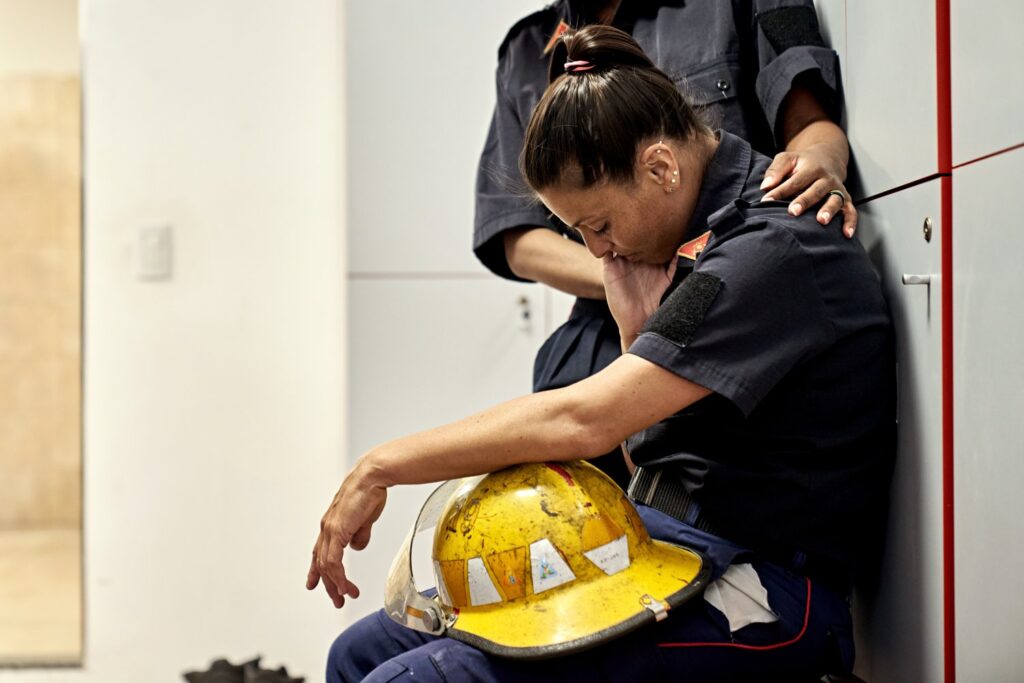Some people, especially those in public service, do admirable things: Think of the health workers who fight to keep a patient alive or the first responders who arrive at the scene of a car accident. But the weight of the soul turns into a burden. Research shows that emergency responders are at higher risk of developing mental health problems, such as post-traumatic stress disorder. How do people survive such stressful experiences and maintain their well-being?
New research from the MIT McGovern Institute for Brain Research suggests that cognitive strategies focused on social well-being can help people cope with traumatic events. The research team compared this method to another well-established emotion regulation strategy and found that it opened up new tools for dealing with very negative situations.
“How you think can improve how you feel,” said John Gabrieli, MIT’s Grover Hermann Professor of Brain and Cognitive Sciences and the Grover Hermann Professor of Health Sciences and Technology, the paper’s lead author. “This study shows that social good practices are particularly useful in improving well-being in people who are frequently exposed to emotionally stressful events.”
The study was published today PLOS ONE, was the first to study the effectiveness of this cognitive strategy. Nancy Tsai, a postdoctoral fellow in the Gabrieli lab at the McGovern Institute, is the paper’s lead author.
A tool for emotional regulation
Emotion regulation is the ability to mentally change how you feel about your emotions, a skill that is important for maintaining mental health. By doing so, a person feels better about coping with adverse events, and emotion regulation has been shown to improve emotional, social, cognitive, and physiological outcomes across the lifespan.
One emotion regulation strategy is “distraction,” in which a person experiences a negative event by imagining it in a distant, distant past, or through a third-person perspective. It is well-documented that distancing is a useful cognitive tool, but it can be less effective in certain situations, especially in socially responsible situations—like a firefighter rescuing a family from a burning house. Instead of distancing oneself, one is forced to engage directly with the situation.
“In these cases, a ‘social good’ approach can be a powerful alternative,” Tsai said. “When a person uses the social good method, he sees a negative situation as an opportunity to help others or prevent further harm.” For example, a depressed firefighter might focus on the fact that his job saves lives. Because this idea had not been backed up by scientific research, Tsai and his team saw an opportunity to further investigate this strategy with Gabrieli.
A novel study
MIT researchers recruited a group of adults and filled out questionnaires to gather information on demographics, personality, current well-being, how they manage their emotions, and how they cope with stress. The cohort was randomly divided into two groups: a remote group and a well-socialized group. In the online study, each group was shown a series of images with either neutral (such as fruit) or highly negative (such as physical injury) content. Participants were fully informed about the type of images and could withdraw from the study at any time.
Each group was asked to use cognitive strategies to respond to half of the negative pictures. For example, while watching a distressing scene, a distant group member may imagine it as a movie screen. In contrast, subjects in the social welfare group may have imagined and portrayed themselves as first responders saving people from harm. For the other half of the negative pictures, participants were asked to look only at them and focus on their emotions. The researchers asked the participants how they felt after being shown each picture.
Social welfare is seen as a powerful strategy
A MIT research team found that distance and good social attitudes helped reduce negative emotions. After viewing negative content, participants reported greater improvement in these strategies compared to when they did not, and reported that both strategies were easier to implement.
The results showed that remoteness generally had a stronger effect. More importantly, Tsai and Gabrieli argue that this research offers strong evidence for social good, a powerful approach that people are more likely to use in situations they cannot avoid, such as saving someone from a car accident. world,” Tsai noted. What’s more, the research team found that those who most successfully used social-good approaches seemed to ameliorate rather than alleviate stress. Tsai said this link could also be linked to psychological mechanisms that affect emotional regulation and how people respond to stress. may be taught.
In addition, the results showed that older adults used cognitive strategies more effectively than younger adults. Previous research has suggested that this may be due to older people’s ability to regulate their emotions, which may be due to life experiences. The authors note that successful emotion regulation requires cognitive flexibility, or a flexible mindset that adapts well to different situations.
“This does not mean that people, such as therapists, have to re-express their emotions in order to fully recover from negative situations,” Gabrieli said. “However, our research suggests that a social welfare approach may be a powerful strategy for dealing with the high emotional demands of certain professions.”
The Mitt Bag says future research is needed to further validate this work, which can lead to the ability to care for others using other cognitive tools.
#strategies #coping #stress


